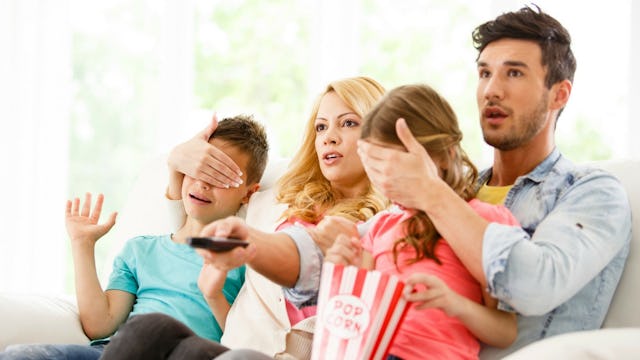Is My Kid Old Enough To Watch That?

In the age of practically unlimited entertainment, parents frequently have to decide what is and is not okay for their children to watch. And those content decisions are rarely simple.
My husband and I have always erred on the side of caution when it comes to what our kids consume. Perhaps it’s because our first child was rather sensitive to scary or disturbing content (even things we wouldn’t have thought of as scary or disturbing). Or perhaps it’s because our kids have a fairly wide age gap, and what a 13-year-old wants to watch is not necessarily appropriate for a 5-year-old.
It may also be because we were both fairly sensitive kids ourselves, and our parents were pretty lax about the movies and shows we watched. I recall seeing Jaws and Alien at a much younger age than I would ever imagine my kids watching them. Though I wasn’t permanently scarred, I do remember the feeling that I was seeing things I wasn’t really ready for.
Now we live in the age of Netflix, Hulu, and Amazon Prime. And judging by stories I’ve heard from friends, many parents out there are surprisingly nonchalant about showing young kids content made for adults.
A friend of mine asked on Facebook what age people’s kids were watching Stranger Things, because her 8-year-old told her that all of the kids in her class were watching it. Another friend shared a story of a family that watched Game of Thrones—a show that shows graphic, brutal rape scenes—with their elementary school-aged kids in the room.
The question of a child’s “readiness” is individual, of course, but that doesn’t mean there are not some common sense standards when it comes to what we expose our kids to. There are reasons for age-based ratings, such as TV-14, R, and MA. Not that you have to stick to those ratings, of course, but they at least provide a guideline for what kids might be developmentally ready to process.
And there is something to be said for developmental appropriateness. For instance, kids younger than about age 7 aren’t able to consistently differentiate between fantasy and reality. From what I’ve witnessed of my own kids’ imaginations over the years, that line is still fuzzy for some kids for years beyond that. Seeing people being killed or violently assaulted can be genuinely upsetting, as they don’t necessarily fully grasp that what they’re seeing isn’t really happening.
Such images can also stick. Surely I’m not only one who remembers vivid detail of things I saw as a kid. Childhood memories have a way of imprinting themselves on our psyche.
I’ve heard many parents say that their kids can “handle” mature content. But I’m curious as to what that means exactly. Isn’t it a little concerning if our kids aren’t having emotionally age-appropriate responses to things they’re seeing?
I also wonder if we always know when our kids are bothered by things. Kids who want to partake in whatever cool things their friends are doing, or who don’t want to be seen as childish or too sensitive, may hide their discomfort with more mature content. Some parents may take unconscious pride in their kids’ ability to “handle” adult content, which can make a child less likely to object and may also cause parents to miss subtle cues that their kids are bothered by it.
Naturally, every parent needs to determine what is and isn’t okay for their own kids. I know some parents, like me, who couldn’t care less about swearing in movies, but hold off on sex and graphic violence. I know some parents who think sex is okay, but violence is too much. I know some parents who think violence is no big deal, but bristle at foul language and sexual content.
For many of us, it also depends on the story, the context, the execution, and the lessons learned from it. Historical violence might strike someone differently than fantasy violence. A tasteful sex scene between a married couple might be a whole different ballgame than two teenagers getting it on in the backseat of a car. The King’s Speech was rated R because of one scene where the king said “fuck” a bunch of times. We let our young kids see it because that was literally the only objectionable scene in the movie, and it wasn’t even objectionable in the context of the story.
I’ve found Common Sense Media’s website an invaluable tool for evaluating movies before seeing them. They offer recommended age ratings from both parents and kids, as well as detailed descriptions of anything that families might find objectionable. For instance, instead of just “sexual content” in a movie, you can read that there’s a scene of a woman a showing a breast, a couple making out, and someone simulating a sex act. Then you can more easily determine if it’s something you want your child to watch.
Whatever your personal philosophies, parents should at the very least be aware of what our kids are seeing and be ready to have conversations about content that might be problematic for them. With so much entertainment so readily available, kids need our parental wisdom and guidance to help prepare them for things they’re going to see and to protect them from content they may not be developmentally ready for.
This article was originally published on